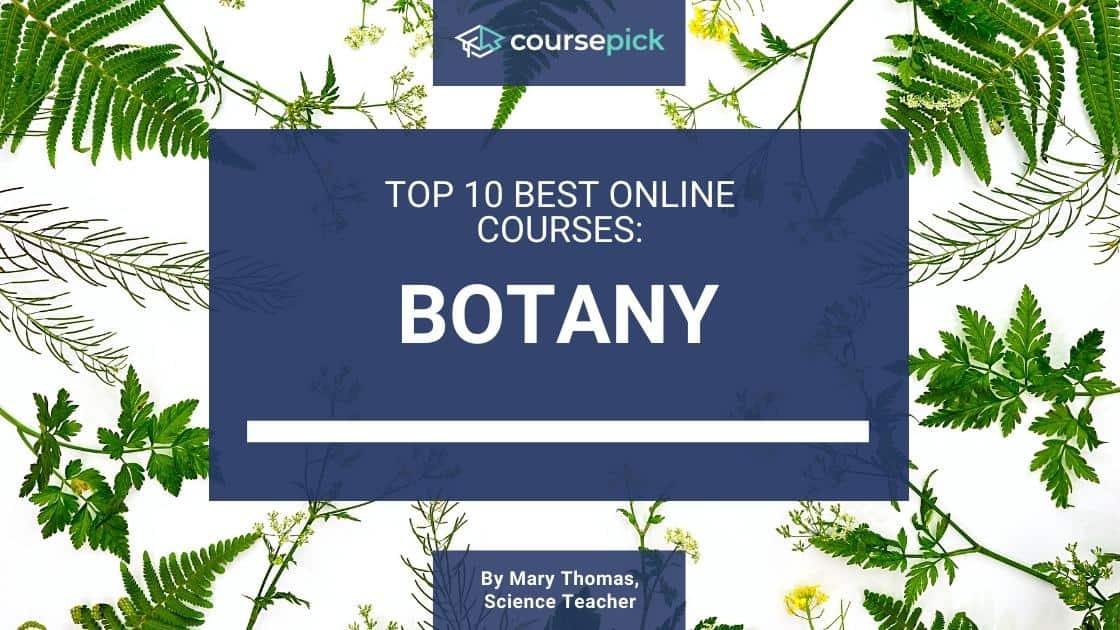
Botany is the in-depth study and understanding of plants. It is essential for comprehending and improving life.
However, it is also an extensive discipline. This article will give you a better idea of where to start your journey as a botanist.
The path of a botanist begins with curiosity. Satisfy that curiosity by pursuing any of these online courses, which provide a glimpse into the different aspects of the field of botany.
- Herbology for Beginners by Mohamad Tabbara
- Angiosperm: Flowering Plant by Samreen Ch
- Understanding Plants – Part I: What a Plant Knows by Daniel Chamovitz, Ph.D.
- Master Gardener Series: Basic Botany by Signe Danler and Gail Langellotto
- Botany Every Day by Marc Williams
- Plant Bioinformatics Capstone by Nicholas James Provart
- Getting Started With Botany by the Royal Botanic Garden Edinburgh
- Understanding Plant Development by Alison
- Botany I – Plant Physiology And Taxonomy by Marie Beerman, Bob James, and Lynette Morgan
- Botanical Illustration with Watercolors by Paulina Maciel · Canela
- Recommended Books
- Frequently Asked Questions
- Resources
- Conclusion
Herbology for Beginners by Mohamad Tabbara
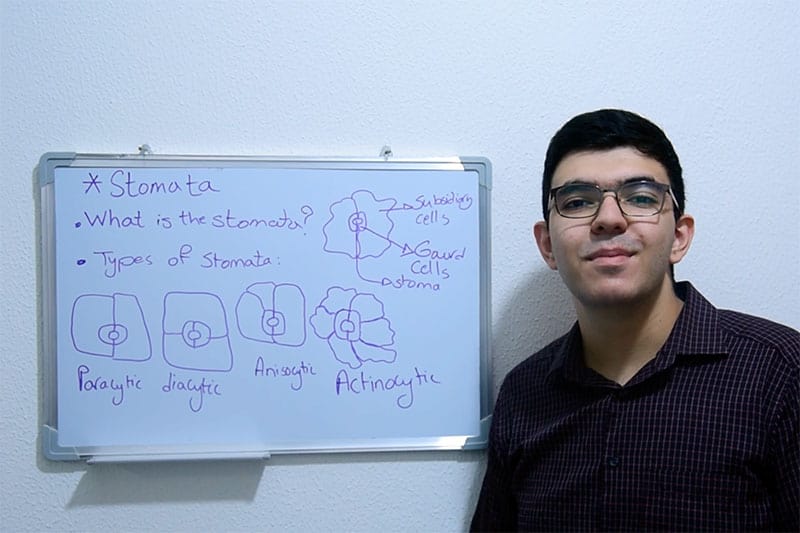
The beginner herbology class in Udemy is delivered by Mohamad Tabbara, a pharmacy student from Beirut Arab University. He specializes in botany, toxicology, and pharmaceutical-related studies.
Mr. Tabbara’s background allows him to be an adept instructor of the three topics covered by this course:
- Introduction and Classification of Drugs. The first part orients the student on what to expect from the course. It also provides insight into how drugs are classified based on origin, which will be helpful in the final assessment of this course.
- Plant Biology and Morphology. The second part covers essential botanical concepts like plant tissues, systems, cell contents, cell division, and morphology. It also includes a microscopic examination of plants.
- Natural Therapies. The last part features six medicinal plants. Some of them are well-known, like Ginkgo leaves.
Botany is a vital discipline for pharmacology. Such a relationship is much reflected in this course as you get basic concepts in both fields.
This class covers essential botany topics like morphology and anatomy, which are fundamental to the field. However, the majority of it is also related to pharmacy. Not to mention, the instructor is also a pharmacy student.
Thus, this course is best only for students who want an introduction to the field of pharmacy and the role that botany plays in it.
Angiosperm: Flowering Plant by Samreen Ch

This Udemy course by Samreen Ch is more specialized than introductory. Samreen is a biology teacher with a master’s degree in botany, making her highly credible in teaching this course.
An understanding of angiosperms or flowering parts is essential in botany. Through this course, you’ll learn about the following:
- Introduction to angiosperms.
- Parts of an angiosperm.
- Reproduction and life cycle.
- Importance of angiosperms.
Because this course focuses on a single topic, i.e., angiosperms, you can expect an in-depth discussion of it. You can also contact the instructor for clarifications and better guidance.
However, because the course is quite specialized, you’ll need, at the very least, basic biology knowledge, like the life cycle of flowering plants. If you take the course with no prior plant biology knowledge, you may find it more challenging.
Thus, this course is best for students who already have some basic biology knowledge but want a clearer understanding of angiosperms.
Understanding Plants – Part I: What a Plant Knows by Daniel Chamovitz, Ph.D.
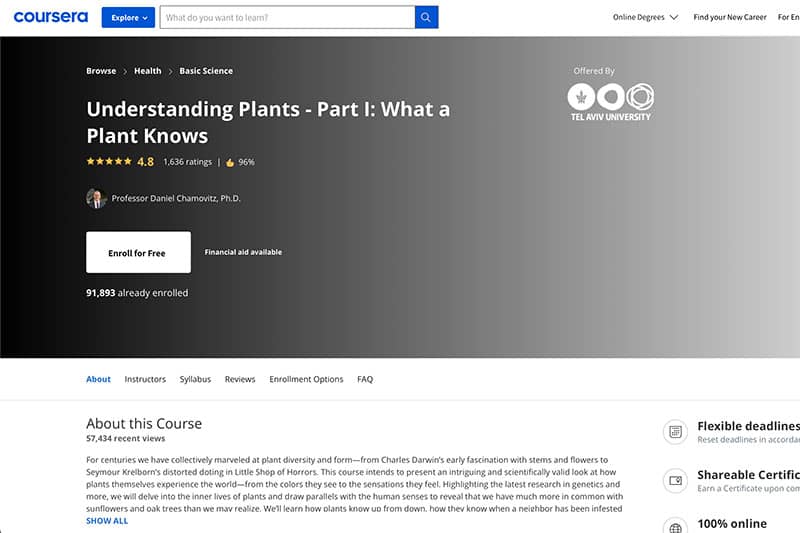
This introductory plant biology class in Coursera is offered by Dr. Daniel Chamovitz and Tel Aviv University.
The course has the same name as Dr. Chamovitz’s famous science book, which has won science book awards and was translated into several languages.
If you take this class, these are the discussions you can expect:
- Plant senses. You’ll explore what plants see, smell, feel, and more.
- Research and scientific method. Learn the basics of how to conduct proper scientific research about plants.
- Study of life. You’ll relate the class to the concepts of life and humans.
This is among the best introductory classes for botany and science on this online education platform. It covers some of the most essential beginner topics in a way that is appealing to non-science specialists.
Thus, this is best suited for you if you are looking for an introductory class with in-depth and creative discussions.
Master Gardener Series: Basic Botany by Signe Danler and Gail Langellotto
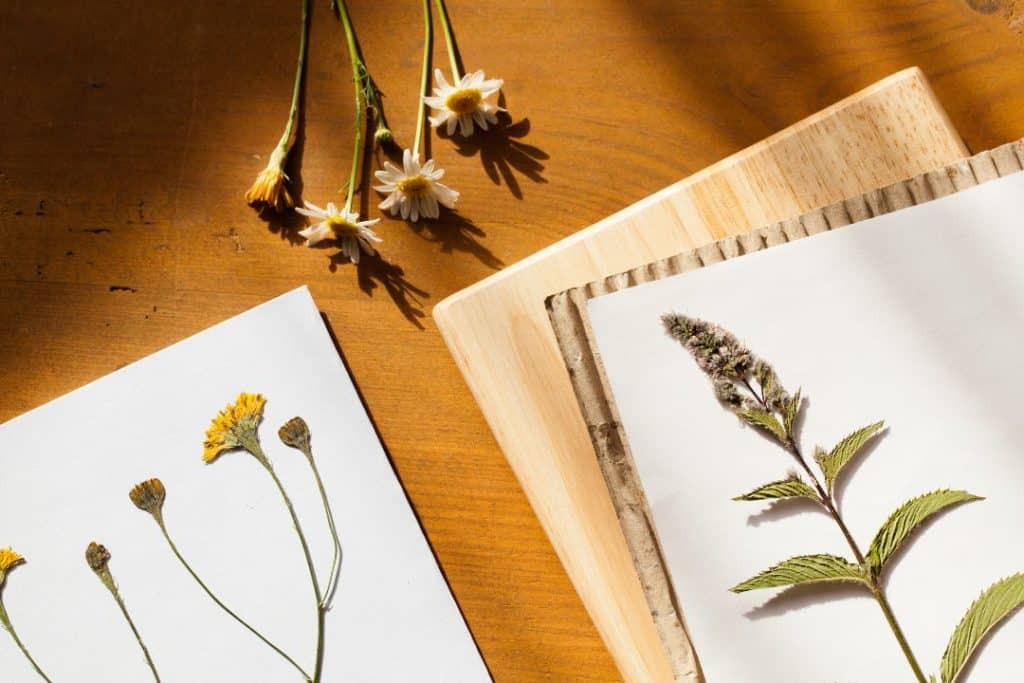
This online course from Oregon State University is a part of the Master Gardener short course series. The series is taught by two instructors.
Signe Danler has a master’s in agriculture and is a veteran gardener and landscape designer. Gail Langellotto is a horticulture professor, ecology lab instructor, and Ph.D. holder in entomology.
Their introductory botany course focuses on the following:
- Parts of a plant. You will learn about basic anatomy, leaf types, and root systems. You will also distinguish monocots from dicots.
- Plant and plant-like classifications. You will learn about different plant classes. You will also learn the differences between plants and similar-looking organisms, like fungi.
- Plant processes. Fundamental processes like photosynthesis and respiration will be discussed in detail.
- Importance of plants. You will appreciate the roles plants play in maintaining our ecosystem.
This is one of the most comprehensive introductory courses for botany because it covers critical topics that will provide a solid foundation for the field. You don’t need much experience in botany or science to understand the class.
As such, this course is best for students who wish for an introduction to the field but have little background knowledge of botany.
Botany Every Day by Marc Williams
The most recent Botany Every Day classes are conducted by Marc Williams. They continue Frank Cook’s (a former ethnobotanist) efforts to educate as many people as possible in the field of botany.
This course centers around plant taxonomy or classification. You will learn about specific plant families and types, such as:
- Poisonous plants
- Woody plants
- Medicinal plants
- European plants
- Aquatic plants
Those mentioned are just a fraction of the many plant groups to be tackled in the series. Each plant group has its own class and webpage on the Botany Every Day website.
Although this course is suited for beginners, you may appreciate and understand the lessons best if you have a significant botany or science background.
Thus, this course is great if you want to improve your knowledge of plant classifications and defining characteristics.
Plant Bioinformatics Capstone by Nicholas James Provart
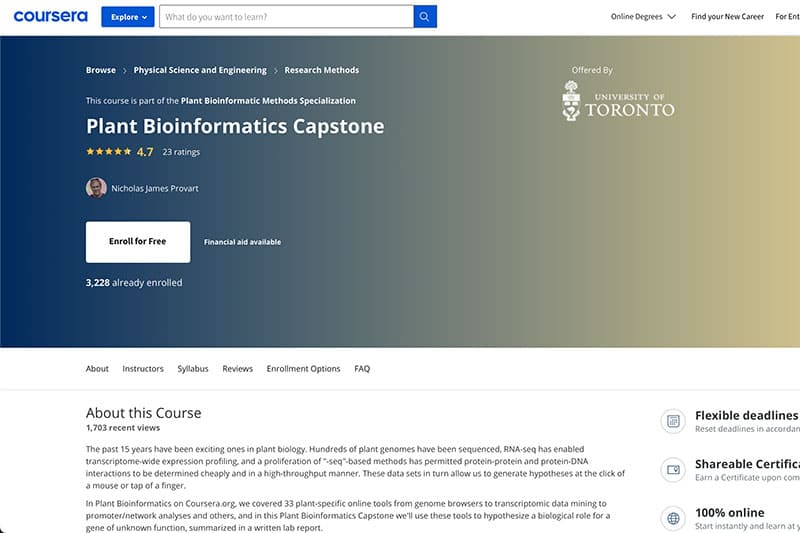
The instructor for Coursera’s Plant Bioinformatics Capstone is a plant cyberinfrastructure and systems biology professor at the University of Toronto.
Dr. Provart also received a Ph.D. in Biology in Germany and has extensive experience in biotechnology, bioinformatics, and research.
Bioinformatics is one of the most exciting technologies for this generation. This field allows us to unravel information held by plant genes or genomes.
Thus, this course focuses on topics like genes and their functions. You get to learn about gene databases and how to analyze genes properly. In the end, you’ll also make a report from your analysis findings.
Because this course covers quite technical topics like gene analysis, it will not serve as a beginner course in botany.
This course is best for students with intermediate knowledge and experience who want to enhance their bioinformatics skills and understanding of the plant world.
Getting Started With Botany by the Royal Botanic Garden Edinburgh
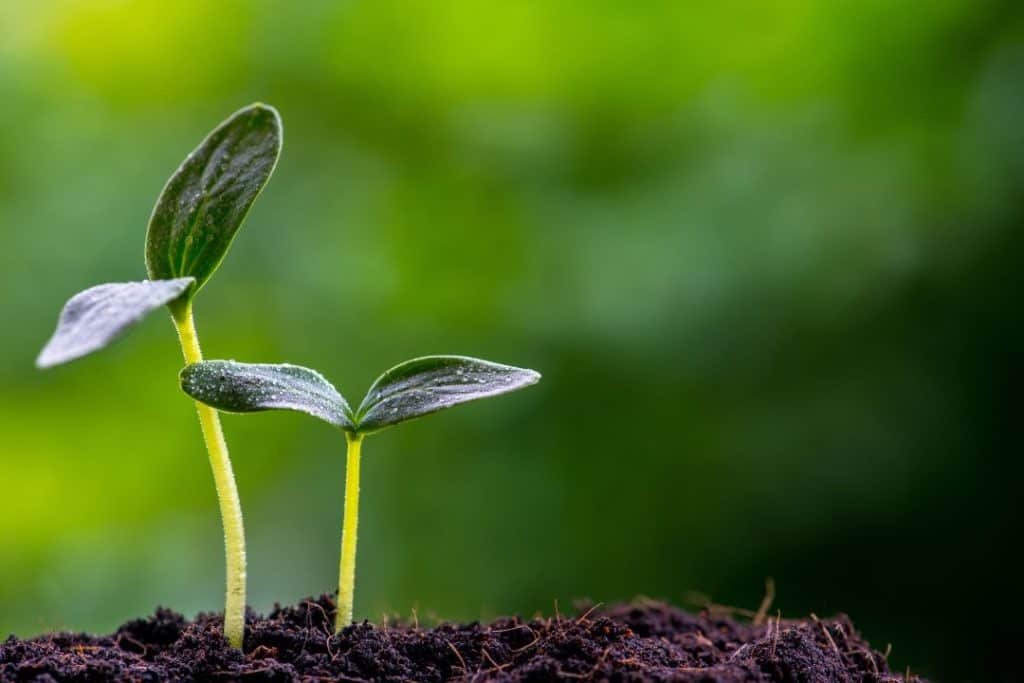
This short online course from the Royal Botanic Garden Edinburgh has no specific instructor. Instead, you will mostly be on your own with technical, tutor, and forum support.
Even if mainly self-guided, the classes are pretty comprehensive and detailed. You’ll learn about these concepts about plants:
- Diversity
- Processes
- Parts
- Classification
- Identification
- Introductory botanist skills
As a beginner course, most topics are introductory and crucial for a great foundation in botany. You’ll also learn basic and essential botanist skills through some practical tasks.
Thus, if you are an aspiring botanist with little background knowledge but great interest, this course may be suited for you. Motivation is highly necessary as you will pursue classes on your own.
Understanding Plant Development by Alison
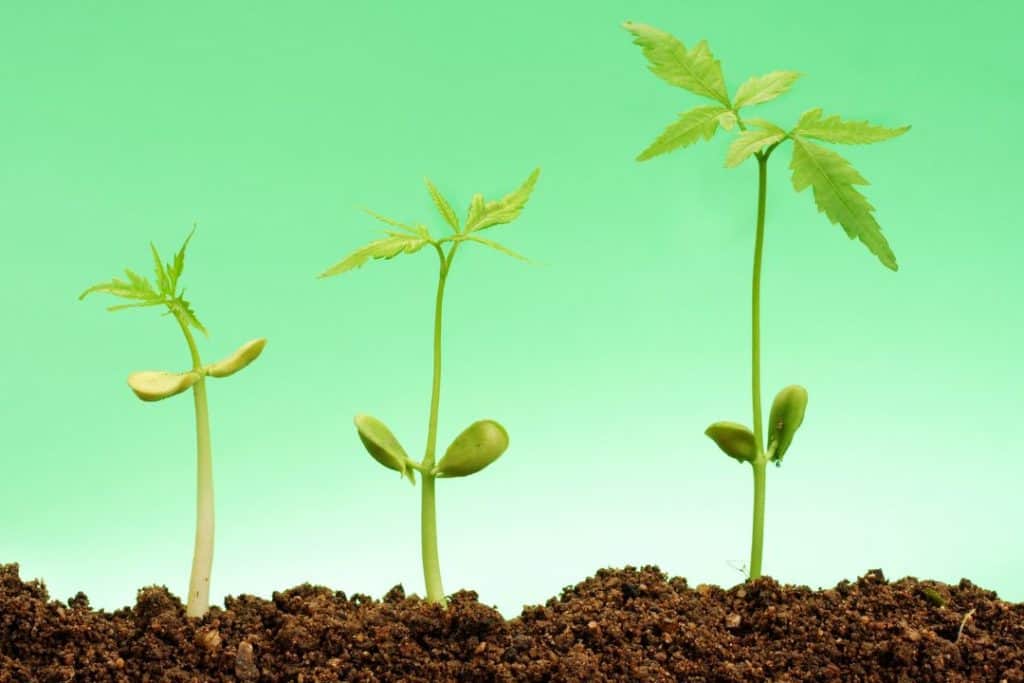
This online course from Alison does not have a specific instructor either. It’s mainly self-guided and entails discipline to power through the modules.
The course is divided into three modules:
- Module 1. The first part introduces the course and discusses basic plant concepts like tissue development, plant life cycles, and cell fates. You’ll see how an organism develops from one cell into a complex system.
- Module 2. You will learn about the techniques used to understand development in the second part of the course. Most of these techniques are based on molecular genetics.
- Module 3. The last module isn’t a discussion. Instead, it’s an assessment to see how well you absorbed the topics from the previous modules.
Although this course covers exciting and essential topics, they are also quite technical.
Moreover, it’s also a self-guided course; thus, discipline and intermediate experience are crucial to understanding the lessons.
Therefore, I would recommend this course as supplementary lessons for those who want to know more about plant development and have some understanding of general plant biology.
Botany I – Plant Physiology And Taxonomy by Marie Beerman, Bob James, and Lynette Morgan
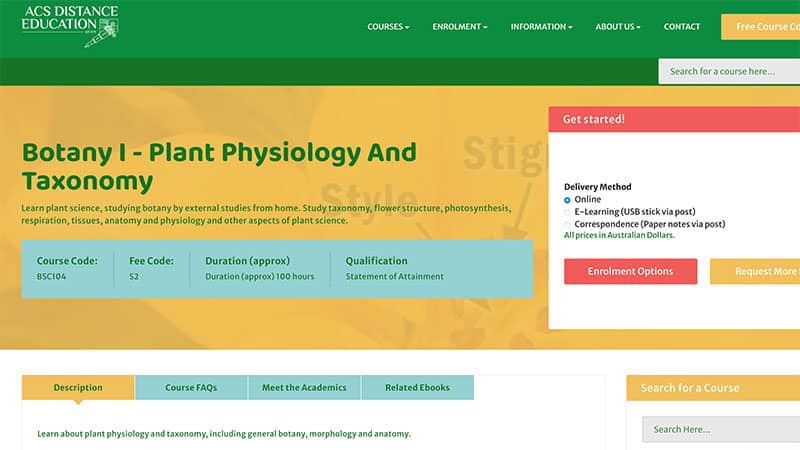
This online botany course from ACS Distance Education is handled by three instructors: Marie Beerman, Bob James, and plant biologist Dr. Lynette Morgan.
All instructors have credible backgrounds in horticulture, a branch of botany. They have earned diplomas, written books, and conducted research in the field.
Compared to the other courses, I find this one more extensive and detailed. These lessons talk about:
- Plant taxonomy
- Plant cells and tissues
- Plant parts
- Flowers and fruits
- Seeds and embryo
- Photosynthesis
- Respiration
- Role and movement of water in plants
- Factors that affect plant growth
Because of the number of concepts covered, this course takes a bit longer than the others. It takes around 100 hours to complete the entire course.
This course is definitely worth it from my perspective. Discussions are in-depth, providing clarity and essence to essential topics. Technical plant terms are also defined.
This class is worth it for individuals who want to start their botany and horticulture journey, especially since the most foundational lessons are covered by it.
Botanical Illustration with Watercolors by Paulina Maciel · Canela
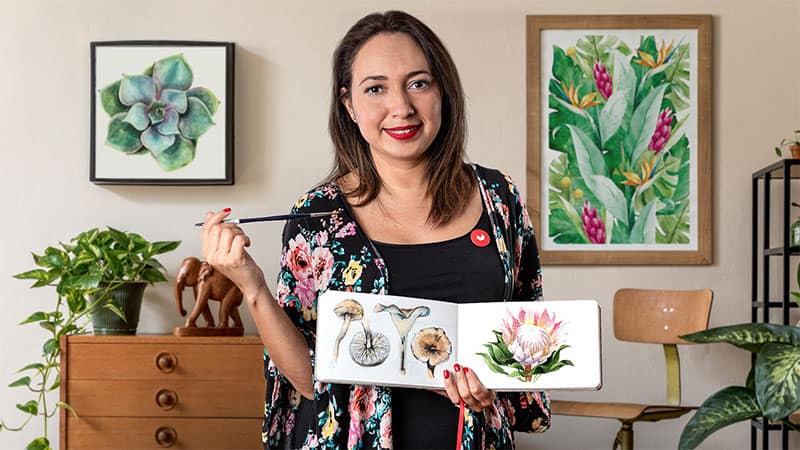
Art plays a vital role in biology. It is a way to study organisms even without their physical presence.
However, to be able to capture the necessary details requires technique and skill. This knowledge you will learn from Paulina, a Mexican designer, illustrator, and watercolor artist.
The course is divided into five parts:
- Introduction. The intro talks about materials and presentations.
- Painting the water. You’ll learn more about watercolor techniques and skills. You’ll learn how to paint different textures.
- Looking for style. This is the part when you learn about botanical illustration styles.
- The botanical composition. Plant morphology and composition are discussed and applied in painting.
- Digital Finish. You’ll be taught how to digitize and correctly render your watercolor botanical art and illustrations.
The whole class is wrapped up with a final project to showcase your learnings and skills.
Unlike the other courses, this class does not provide introductory knowledge or in-depth discussions of botanical concepts. It covers only botanical topics relevant to the proper illustration of plants.
Thus, it’s suited only for people interested in becoming botanical illustrators or who want to improve their skills in illustrating different plants.
Recommended Books
To become a good botanist (or scientist), you must read several books and papers. You can begin your reading journey with these two books.
Botany in a Day: The Patterns Method of Plant Identification Paperback by Thomas J. Elpel
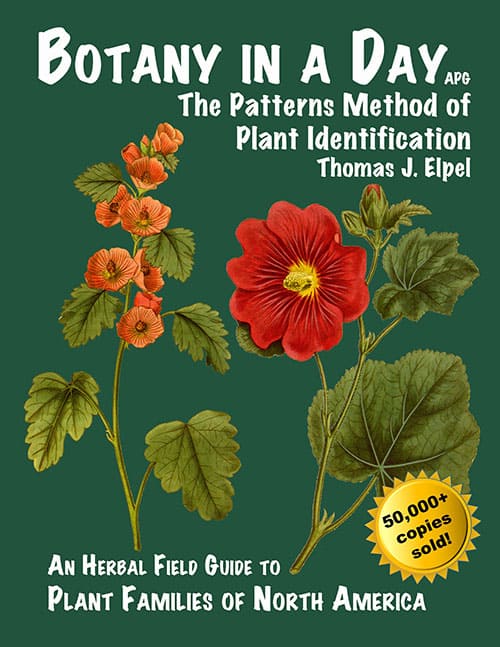
Botany in a Day by Thomas J. Elpel is among the most famous botanical references. Although most of the plants included are in North America, the book is an educational resource worldwide.
In fact, it is one of the primary references for Botany Every Day, one of the online courses I recommended.
Its attention to detail and introduction of patterns makes it an excellent reference for any student.
By understanding and memorizing these patterns, you will be able to identify related plants much faster and match them to their families.
Thus, by reading this book, you may be able to identify certain plants that you may not have seen before.
This is an invaluable skill for botanists and students out on the field, who may need to quickly identify different plant species.
This specific edition is also one of the most recent, published last May 15, 2013. It’s available in full color, making it easier to identify the patterns.
Newcomb’s Wildflower Guide Paperback by Lawrence Newcomb and Gordon Morrison
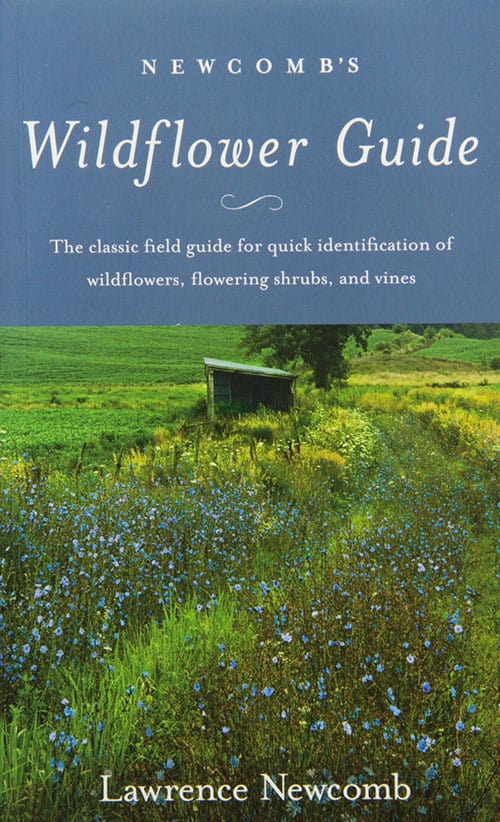
Like Elpel’s book, the Newcomb’s Wildflower Guide Paperback by Lawrence Newcomb and Gordon Morrison helps readers discern better between various plants.
It includes detailed illustrations, allowing you to familiarize yourself with different plants without seeing them in person. These visual pictures also come with a key system.
The key system is a quick and easy way for plant identification. It requires you to answer only a few questions to know what species you’re dealing with.
Frequently Asked Questions
Resources
- Botany for Beginners: an Introduction to the Study of Plants – nature.com
- Introduction to Botany – Environmentalscience.org
- Careers in Botany – Botanical Society of America
- American Society of Plants Biologists
- American Society of Plant Taxonomists
SILVA, Helena, PINHO, Rosa, LOPES, Lísia, et al. Illustrated plant identification keys: An interactive tool to learn botany. Computers & Education, 2011, vol. 56, no 4, p. 969-973.
HERSHEY, David R. A historical perspective on problems in botany teaching. The American Biology Teacher, 1996, vol. 58, no 6, p. 340-347.
UNO, Gordon E. Botanical literacy: What and how should students learn about plants?. American journal of botany, 2009, vol. 96, no 10, p. 1753-1759.
Conclusion
If you’re interested in becoming a botanist, then you should try out some of our recommended botany courses.
They can serve as your stepping stone into the field or help you take your career as a botanist one step further.
Make sure to let us know how they worked for you in the comments section, and feel free to suggest any courses we may have missed!

